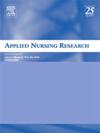Delirium in older adults following traumatic brain injury during the acute stage: Validation of the Chinese version of the confusion assessment method
IF 2.2
4区 医学
Q1 NURSING
引用次数: 0
Abstract
Aim
To translate and validate the confusion assessment method into traditional Chinese (CAM-TC) and explore the incidence of delirium following traumatic brain injury (TBI) in the ward setting.
Background
The CAM is a widely recognized tool for screening delirium, but it has not been translated into Traditional Chinese version, and it has seldom been used to assess delirium in TBI survivors in general wards.
Methods
Patients aged 20 years or older, diagnosed with TBI, and with a Glasgow Coma Scale (GCS) score of 9 or higher at admission were included. The Diagnostic and Statistical Manual of Mental Disorders, Fifth Edition, Text Revision (DSM-5-TR) criteria were employed as the gold standard. Cohen's kappa was used to calculate inter-rater reliability.
Results
Our study enrolled 100 patients with a mean age of 68.5 years and mild TBI. Post-TBI delirium was diagnosed in 10 % of the sample using DSM-5-TR criteria. A subset of 10 patients was selected for inter-rater reliability analysis, and a kappa value of 1.0 was obtained. The sensitivity, specificity, and area under the receiver operating characteristic curve values were 0.90, 0.98, and 0.94, respectively.
Conclusions
The CAM-TC is a reliable tool for screening delirium following TBI in the ward setting. Our findings provide new insights into post-TBI delirium in this environment. Implementing an applicable delirium screening tool for post-TBI patients could facilitate further research on prevention and intervention strategies.
老年人创伤性脑损伤急性期谵妄:中文版神志不清评定方法的验证
目的将认知混乱评估方法(CAM-TC)翻译成中文并进行验证,探讨创伤性脑损伤(TBI)后谵妄在病房的发生率。CAM是一种被广泛认可的谵妄筛查工具,但尚未翻译成繁体中文版本,在普通病房中很少用于评估TBI幸存者的谵妄。方法纳入年龄在20岁及以上,诊断为TBI,入院时格拉斯哥昏迷评分(GCS)为9分及以上的患者。《精神障碍诊断与统计手册,第五版,文本修订版》(DSM-5-TR)标准被用作金标准。采用Cohen's kappa法计算评分者间信度。结果我们的研究纳入了100例平均年龄68.5岁的轻度TBI患者。根据DSM-5-TR标准,10%的样本被诊断为脑外伤后谵妄。选取10例患者进行评分间信度分析,kappa值为1.0。灵敏度为0.90,特异度为0.98,受试者工作特征曲线下面积为0.94。结论CAM-TC是一种可靠的筛查创伤性脑损伤后谵妄的工具。我们的发现为这种环境下的脑外伤后谵妄提供了新的见解。实施一种适用于脑外伤后患者的谵妄筛查工具,有助于进一步研究预防和干预策略。
本文章由计算机程序翻译,如有差异,请以英文原文为准。
求助全文
约1分钟内获得全文
求助全文
来源期刊

Applied Nursing Research
医学-护理
CiteScore
4.50
自引率
0.00%
发文量
65
审稿时长
70 days
期刊介绍:
Applied Nursing Research presents original, peer-reviewed research findings clearly and directly for clinical applications in all nursing specialties. Regular features include "Ask the Experts," research briefs, clinical methods, book reviews, news and announcements, and an editorial section. Applied Nursing Research covers such areas as pain management, patient education, discharge planning, nursing diagnosis, job stress in nursing, nursing influence on length of hospital stay, and nurse/physician collaboration.
 求助内容:
求助内容: 应助结果提醒方式:
应助结果提醒方式:


